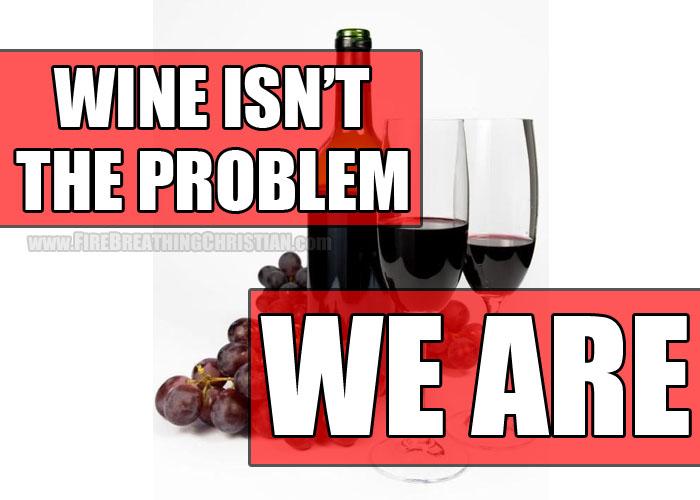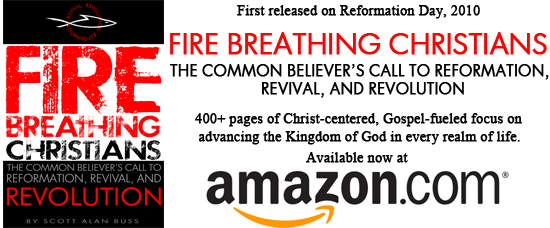
Beer.
Wine.
Guns.
Video games.
In our home, these are valuable tools that we try to keep on hand. They’re each gifts from God that help me and my family better appreciate both the variety of material blessings that He’s given us, and the necessity of our using those things well.
Let me explain a little:
The idea in our home is to have our little ones learn and come to understand the presence of certain things like beer, wine, guns and video games as normal. Nothing to obsess over. Nothing to worry about.
They are things.
Tools.
Blessings.
Like other tools and blessings provided by God, they can be abused and, though their abuse, become quite destructive. Think: fire. Or sexuality. Or cars. Or pretty much anything else.
What we’re trying to show by having these things at least physically present as a regular part of life in our home is that they are both A) something to enjoy in a proper context, and B) nothing to fear in and of themselves.
Of course, the “in a proper context” part is vital. So there’s no obsessing over these things, there’s no making them a center point of our home or family life, and there’s no abusing them through overuse.
We just try to enjoy them in proper moderation from time to time, as schedules and budgets permit.
Right now that makes video games an almost-never-actually-used thing in our home. We just don’t have the time. But even then, we do find value in having video games present downstairs in “the TV room” where we gather for movies or to play games from time to time. The games are just sort of sitting there mostly these days, but even that is a help.
It makes a point, that point being: There’s nothing to be afraid of here.
Just like with the guns in the house.
And the beer in the house.
And the wine in the house.
And the toys, beds, food, and coffee in the house.
The point is that we can have these things in a context that has us as the master. Not the slave.
These things are our tools.
We are not theirs.
Get it?
I hope so.
And I hope that little Rosie, Wolfgang, and Sebastian do, too.
So far, so good.
I say all of that in order to shed a little personal perspective and context on the topic of alcohol use from a biblical worldview perspective.
When this comes up, as it often does, I tend to start the conversation (or my part of it) by referencing Jesus’ first recorded miracle, which was to make high quality wine (not grape juice) at a party that had been going on for a while. (See: John 2.)
Before I go any further, please allow me to lay a few foundational points:
- There are certainly contexts in which individuals should avoid material things that tempt them.
.
Even in those contexts, however, the ultimate, long-term goal should be to build discipline and maturity to a point that the thing (idol) that once ruled over us no longer does. While the modern psychobabble infested age in which we live relentlessly pitches and preaches counterfeit concepts like “the disease of alcoholism”, the Christian worldview presents us with a clear understanding of sin being the cause of our abuse of the things that God has made. The things are not the problem. Our sinful abuse of things is the problem.
.
Put another way: We are the problem…no matter how much we might prefer to blame alcohol, guns, cheesecake or whatnot for our sinful abuse of them.
. - The pursuit of holiness is vital. It is central to the Christian worldview and life in practice.
.
To pursue holiness, we must rightly divide truth from error with increasing precision, lest we be diverted, distracted or even destroyed by our confusion as to what is lawful Christian behavior and what is lawlessness. We cannot “make disciples of all the nations, teaching them to obey all that [Jesus] has commanded” if we do not know much about all that Jesus has commanded (see: Matthew 28:18-20). Out of a love for a Lord and a commitment to His Gospel-fueled Great Commission, we must always strive out to better know what accurately reflects His Nature.
.
The better we know Him in detail, the more easily we will detect, confront and correct counterfeits of His Nature, including counterfeit approaches to law, legalism, and religion.
.
In the context of this subject (alcohol use from a Christian worldview perspective), it seems important to confront and correct some of the overtly anti-biblical legalisms that have been constructed by many claiming the name of Christ. The construction of sub-biblical legalistic barriers between men and the things than men abuse due to their sinful nature is not a path to building maturity, as some claim. It is instead a path to preventing maturity and assuring perpetual immaturity.
.
God has purposefully given us challenging things and tools to master. These things are blessings. Our persistent running and hiding in order to avoid interaction with, much less mastery of, these things doesn’t make us better. It doesn’t make us more mature. It makes us perpetual children – and often frightened, easily manipulated children at that.
. - It is critical that we be willing – and eager, even – to surrender our “right” or “freedom” or “liberty” in certain instances where our partaking in a certain activity or consumption of a certain food or drink might cause a weaker brother or sister to stumble. (See: Romans 14.)
.
That said, we cannot allow such beautiful and necessary demonstrations of selfless, Christ-honoring love for one another to be perverted into universal requirements of abstinence of certain things that are not at all in and of themselves sinful. The fact that someone, somewhere may be tempted to gluttony if they see me eat a cheesecake in public should in no way, shape, or form compel me as a Christian to never eat cheesecake again in public.
.
It is one thing to model compassion and grace toward a particular brother or sister who is struggling at a particular moment in time to overcome an idol that has ruled over them in the past. It is quite a other to model complete, universal capitulation to that idol in a sense that has it effectively remove certain God-given tools and blessings (like guns, beer, wine, cheesecake, etc.) from public use or even acknowledgement.
There is no workaround for mastery.
There is no shortcut to maturity.
Running and hiding from hard things may seem like a wise route, and may well at times be a wise approach in the very short term, but it is never the long term path to true maturity, which is another way of saying it is never a viable path to true holiness.
While the modern “alcohol is the devil” line is often presented as a very Christian thing these days, we need to recognize it for what it is: A fundamental confusion as to the nature of God’s creation and a fundamental denial of both our sinful and our personal responsibility for the sinful conduct unleashed through our sinful nature
Put another way, the “alcohol is the devil” vibe is just another way of us blaming challenging and potentially dangerous things in God’s creation for our sinful abuse of those things.
It’s Genesis and Eden all over again (see: Genesis 3). We just love to blame everything and anything but us for our sinful conduct.
Sadly, there are many Christians who are still very much in the mode of railing against alcohol consumption as inherently evil (including many whom I respect and even like quite a lot, like John MacArthur, a famous teetotaler teacher who we’ll examine more in a moment).
To help us dive a little deeper into this, let’s consider some excerpts from an excellent article by Dr. Joel McDurmon on the subject, entitled John MacArthur Drops the Booze Bomb:
“. . . MacArthur unwittingly makes it clear that he is indeed more interested in fallacy than truth when he bemoans, “Cast a disapproving eye at any of those activities [like drinking alcohol] , and you are likely to be swarmed by restless reformers denouncing legalism and wanting to debate whether it’s a ‘sin’ to drink wine or smoke a cigar.” Hold on a minute: is this something to be argued against? Aren’t legalism, sin, and maturing in Christian freedom the issues at the heart of the question after all? But MacArthur sees it necessary to run from such “debate,” and instead use fallacious associations to divert the discussion.
God forbid we discuss “sin.” That might actually lead to people realizing it’s not a “sin” to drink beer after all! “Sin”? Bleh!
Instead, only after loading the unnecessary ideas of drunkenness and debauchery into the image of drinking, does he reintroduce the topic of sin: “no symbol of sin’s bondage is more seductive or more oppressive than booze.” But pay close attention to the bait-and-switch: he refuses to address the scriptural question of mere drinking as “sin”; he will only address the topic after he has hoodwinked his audience by assuming “drinking=drunkenness.” He’s shifting the focus of the debate. It’s like moving the goalposts right when the kicker kicks the ball.
This is the typical teetotaler view: in their little mental world (and believe me, it is little), there is no possibility at all of drinking alcohol with moderation, and certainly not with what Calvin called “moderate liberality.” ((John Calvin, Commentaries on the First Book of Moses Called Genesis, trans. by John King (Grand Rapids, MI: Eerdmans, 1948), 362–3.)) Oh no. There are only two options: abstinence or drunkenness. If you even so much as sip wine, you are at least partially a drunkard, a “boozer,” and you have unleashed the most powerful forces of hell into all of society, your family will come to ruin, this is inevitable, non-negotiable, and the devil from here is unstoppable. Therefore, it is mandatory to abstain.
This is exactly the route MacArthur takes. Thus, he begins his post by speaking of “beer,” but can’t get beyond a few sentences before he switches to the pejorative, “booze”—an old phrase which has specific reference to drunkenness. MacArthur then retains this association the rest of the way through the post. Drinking is no longer considered by itself, but only with associations like “booze,” “controlled substances,” “society’s seamy side,” “ambience of a pool hall,” “casino,” “intoxicants,” “alcoholism,” “drug abuse,” “addiction,” “fleshly desires,” “deadly spiritual dangers,” “damage,” “Bohemianism,” “Sodom,” “flouting taboos,” “fleshly lusts,” “unfettered indulgence,” and “bondage.”
. . . The fact that MacArthur uses this tactic shows he is not interested in a truthful, scriptural view of the subject. He is interested in perpetuating a half-truth. Well, here’s the real deal: there is no Scriptural prohibition on alcohol. But last time I checked, there is a clear prohibition on half-truths (Ex. 20:16).”
How can we rightly model the pursuit of holiness when we engage in such tactics?
We can’t.
McDurmon continues (with bold emphasis added by me):
“What probably upsets the modern prohibitionists most of all is the fact that YRRs and others who imbibe today are simply ignoring them. That’s right. While of course condemning drunkenness and retaining a sensitivity to recovering alcoholics when necessary, the new generation of less fearful, more mature Christians simply refuses to play that cowering game where we’re supposed to shrivel before the wailing imams of the dry jihad. We’re done with it because it’s unscriptural and humanistic. It’s not just unbiblical, it’s anti-biblical.
The prohibitionists ruled the conservative Christian scene for several decades, but their fallacies have become exposed. They have lost their grip on Christians. They have lost most of their audience, and their message has lost its “umph.” They are trying to give their stump speech without a stump. They have lost moral credibility with an entire generation of Christians who have seen the light of Scriptural truth on this issue and many others.
But MacArthur and I agree on one aspect: the issue is maturity and self-control. He says, “But sober-minded self-control and maturity are virtues commanded and commended by Scripture; these are not man-made rules or legalistic standards.” That’s absolutely right. His problem is that he has the concept turned on its head. The holdovers from the old-line prohibitionists have always mistaken forbiddance for maturity. They have always tried to create the appearance of maturity by imposing extra-biblical standards, and thus creating their own brand of legalism. Scripture doesn’t teach prohibition, so those who do teach it are being legalistic. There is no way around this.
True maturity is just the opposite: it is the ability to use the gifts God has given us and even prescribes in places without abusing them. Anyone who runs from this standard is not interested in maturity at all. They are interested in keeping Christians childish under the guise of safety. Prohibitionists have always forbidden maturity under the guise of purity. It is legalism, and thus, idolatry.”
There is, by the way, a religion out there that does completely forbid all consumption of alcohol. It is not Christianity; it is Islam. When Christians and Christian leaders demand abstinence, they have more in common with Mohammed than with Christ.”
Whole lotta heavy and important stuff there.
Much to kick around.
Much to ponder.
Much to act upon.
And much to celebrate…maybe with a fine craft beer or glass of wine…or some cheesecake and Zelda.
If you know of anyone who might appreciate this post, please share it. If you’d like to see articles like this continue, please click here to help.
Please also “like” us on Facebook, “+” us on Google+, follow us on Twitter and feel free to sign up for new articles by email using the buttons in the upper right corner of the FBC home page.
Please check out The Fire Breathing Christian Podcast too, as well as the latest designs at Fire Breathing Tees and the latest memes at the Fire Breathing Memes page.
You can also help support the Fire Breathing Christian mission by checking out these books:
Stupid Elephant Tricks – The Other Progressive Party’s War on Christianity takes a painful but much needed look at how Christ-less “conservatism” has captivated Christians and co-opted them into helping march the culture ever deeper into darkness:
_____________________________________________________
The Beginning of Knowledge: Christ as Truth in Apologetics is an approachable, easy to read introduction to Christ-centered apologetics:
 _____________________________________________________
_____________________________________________________
Apathetic Christianity: The Zombie Religion of American Churchianity explores the tragic true horror story of all-American dead religion masquerading as Christianity:
_____________________________________________________
On Education is a compilation of some of the most provocative and compelling Fire Breathing Christian articles on the subject of children’s education:
_____________________________________________________
There Is No “God-Given Right” To Worship False Gods is a compilation of some of the most provocative Fire Breathing Christian articles on the subject of America’s embrace of a satanic approach to religious liberty:
_____________________________________________________
Fire Breathing Christians – The Common Believer’s Call to Reformation, Revival, and Revolution is the book that first presented the FBC mission to apply the Gospel-fueled Great Commission in every realm of God’s creation:
_____________________________________________________
An alternate white cover version of Fire Breathing Christians is available:
_____________________________________________________
There is also an alternate black cover version of Fire Breathing Christians:
Finally, here are a few good intro/reminder links for those of you who are new to Fire Breathing Christian and curious about exactly what’s goin’ on ’round here:
What are you, some kind of [insert label here] or something?!
What’s with that shark-fishie graphic thing?
Intro to Fire: The Power and Purpose of the Common Believer
When the Bible gets hairy. (Or: Is it right for men to have long hair?)
And especially this one: Never forget that apart from God’s grace you and I are complete morons.
Thank you for your support!











I really like most of your posts, but this one seems very inane to me.
It gives the appearance of biblical wisdom while really just giving one an excuse for "making provision for the flesh".
"But put on the Lord Jesus Christ, and make no provision for the flesh, to gratify its desires." Romans 13:14 (ESV)
If you are tempted by something, is it not wiser to not have it around, than to keep it nearby and hope you can resist the temptation and thus show your supposed "maturity"?
Who can truly define where the line is between "abused" and "not abused"? Between "drunk" and "not drunk".
And please don't use the familiar "analogy" of food and gluttony. You have to have food to live; you do not have to have alcohol to live.
My father, a very godly M.D., who continually saw the wreckage left by alcohol in both individuals and families, commanded our family (as Jonadab, son of Rechab did) not to use alcohol. (No, he did not command us to live in tents ). And he often illustrated his perspective on this and many other things with this story:
“The Cliff” … how close will you go?”
There once was a rich lord, who was in need of a carriage driver. He interviewed several potential drivers asking them all the same question, “The road which leads to my castle has many dangerous areas. On one stretch of that road there is a steep mountain on one side and a sharp drop-off into a canyon on the other side. If you were to be selected to drive my carriage, just how close to that cliff do you think you could get the carriage without going over the edge?”
The first man said timidly, “Well, I am a good driver! I suppose could get your carriage to within 6 feet from the edge!”
The second man said more confidently, “I am an excellent driver! I could get your carriage at least 3 feet from the edge!”
The third man said boldly, “None surpass me in excellence! I am sure I could get the carriage right up to the edge of the road without going over!”
But for all their professed skill, it was the fourth man who was hired . . .
The fourth man had said, “Sir, if you would give me the honor and privilege of driving your carriage, I would stay as far away from the edge of the cliff as possible.”
Another very wise M.D., the great Australian founder of “The Christian Anti-Communism Crusade”, said:
“There are millions suffering from alcoholism in America today, but no teetotalers are among them.” Dr. Fred Schwarz, M.D.
Finally, my perspective on this topic is pretty much articulated very well in these words from Scripture:
“For the kingdom of God is not a matter of eating and drinking but of righteousness and peace and JOY in the Holy Spirit.”
Romans 14:17
“Thou hast put MORE JOY in my heart THAN THEY HAVE when their grain and wine abound.”
Psalm 4:7
"True maturity is just the opposite: it is the ability to use the gifts God has given us and even prescribes in places without abusing them. Anyone who runs from this standard is not interested in maturity at all. They are interested in keeping Christians childish under the guise of safety. Prohibitionists have always forbidden maturity under the guise of purity. It is legalism, and thus, idolatry.”
There is, by the way, a religion out there that does completely forbid all consumption of alcohol. It is not Christianity; it is Islam. When Christians and Christian leaders demand abstinence, they have more in common with Mohammed than with Christ.” "
Thank you for the reminder that God wants us to grow up, to mature, to be both WISE and FREE.
Filled with the Holy Spirit, and not a slave to fearful, man-made rules and regulations.
Thank God that Jesus our Saviour/Liberator is our Example, and not Mohammed!